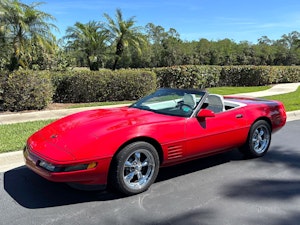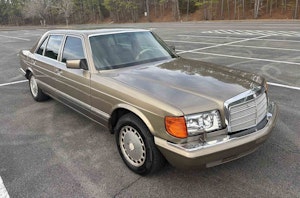Media | Articles
Never Stop Driving #94: Eclipsed
Last Monday, two friends and I headed south from Ann Arbor to intersect with the solar eclipse path of totality, which cut across northwest Ohio. This was a last-minute trip so once we freed ourselves from work commitments, we only had about two hours to make the 70-mile trek. That’d be easy on a normal day, but the major highways were already clogged. Time for the backroads.
Southern Michigan is so flat that the rural roads, many of which are gravel, are laid out in a grid. I figured they would be lightly traveled so we headed south on the first unpaved road we encountered. When it ended, we jogged west until we hit another dirt road going south. We rolled down the windows to enjoy the warm air and aromas from the surrounding farm fields, which had that early-spring green sheen. Delightful. Our haphazard route was slow, but we didn’t worry about missing the total eclipse; the point was our spontaneous journey, not the destination. (Better to be moving than stuck in traffic, says the bloke who writes a column called “Never Stop Driving.”) We’d get as far south as possible, see what we could see, and just enjoy this mini adventure during a workday. It was like playing hooky (if you’re too young to know what that means, look it up).
With just minutes to spare, we joined some 30 other cars in a dirt parking lot in Liberty Center, Ohio (population: 1100). The glow of the full eclipse was moving as was the partial darkness that traveled like a wave over the countryside. The thing that really caught my eye, however, was a vintage military truck parked nearby with a roof-mounted generator and 20-foot antenna.

The owner explained that his green M109 truck and its two generators could run on cooking oil, diesel, used motor oil, and—I think he said—kerosene. The huge antenna was driven skyward via air pressure supplied by an onboard compressor he installed along with many other DIY modifications. The thing had A/C, a fridge, a stove, a bed, and 10 wheels mounted on three axles. He’d set up in the lot that morning, because the local police and emergency responders, who were worried that the crowds uploading eclipse photos and videos would clog cellular signals, deployed a network of radio operators like him to ensure communication.
Impressive, right? I joked that if the proverbial s&^% hit the fan, I would come groveling. That dude knew how to do things, to build things. Which reminded me of our ongoing shortage of folks like him.
Marketplace
Buy and sell classics with confidence
I’ve written many times about the gap between the need for skilled tradespeople and the supply, a situation brought into focus by my ongoing effort to bring a $25,000 Ferrari back to life. I’ve struggled to find experienced and willing craftspeople to do things like paint and interior work. The tide, however, may be turning.
Last week, The Wall Street Journal reported that vocational school enrollment is surging. One 20-something interviewed for the article trained to be a welder instead of going to college, saying that he didn’t want to follow the lives of his parents, who stare at screens all day. More and more teenagers, the WSJ reporter observed, see burgeoning AI, mass corporate layoffs, and student debt as signs that a physical skill could be a recession-proof job.

The WSJ article follows an earlier one that described how a Maine lobster town fought to bring shop classes back to the local high school. I am emphatically in favor of this. Even if students don’t find a career in shop class, they’ll gain useful, lifetime skills. Don’t we all need to know how to do things? When are we, as a society, going to chuck the whole white collar/blue collar distinctions and career paths?
This is personal, and not just because I want to get my old Ferrari back on the road. I was steered away from high-school shop classes simply because I had good grades, even though I had a small business repairing lawnmowers. I loved cars and mechanical things, so I went to an engineering college only to learn that engineering had morphed into a desk job. I hated it, but we’ve all been told, “you have to have a degree” so I stuck it out and spent the first decade of my adult life paying off the loans.
You might be thinking, doesn’t this guy Webster have a dream gig typing about cars in front of a screen? Admittedly, America’s imperfect educational and vocational training systems did just fine by me in the long term. Since I work on my own cars, however, I long ago learned that what I enjoy as a hobby is actually hard work, which makes me respect the folks who do it for a living all the more. I also spent a sweltering summer mixing cement in Newark, New Jersey, so I know the risk of unduly romanticizing physical labor. We do, however, need to get rid of the stigma that the trades are a consolation path for those who don’t go to a four-year college.
Thanks for reading!
Larry
P.S.: Your feedback is very welcome. Comment below!
Please share this newsletter with your car-obsessed friends and encourage them to sign up for the free weekly email. The easy-to-complete form is here. And if you’d like to support the efforts of Hagerty Media, please consider joining the Hagerty Drivers Club.














I retired from a nuclear power plant that employed literally hundreds of skilled laborers and yes, skilled welders can make six figures. One of our biggest problems was finding craft that could pass the drug screening. Pot may be legal in the state but it’s still against federal law which is what the plants usually go by, and they have random testing daily. By the way, did you find a good interior person in the Ann Arbor/central Michigan area?
Yes, thank you. I found someone to do the interior and it’ll hopefully start this summer.
I should have taken more shop class as all I wanted when I was in high school was to work for Chuck down at the corner Chevron. Back then, you’d drive in, the bell would ring and Chuck would be there to check your oil and fill your car with ethyl.
But I went to college and started my first career. The paperwork soured me on that so I joined the family business that I grew up in. Sales would pay the bills but I got to get dirty installing products that we couldn’t find craft to do.
My career path continued with other “management” jobs but I was always hands on. Nothing irked more more than asking a manager why we would hire a trade when we should know how to fix that ourselves. I’d grab him and his staff and we’d go have some learnin’.
I tried to instill that with my two sons both of which are engineers. Thankfully they both can turn wrenches.
Being retired and building drift cars with my son is a dream come true.
Really enjoyed your article, as I have a grandson who is very sharp in school still is undecided which way to go as far as a job. I was able to coerce him to help me work on my old Ford tractor the other day and I have got to believe he learned a thing or two in the garage. It was a good day for both of us, I guess you could call it a sharing moment. While I’m fairly sure he is not going to be a mechanic at least he knows what different tools are and how to use them. I love the old stuff and maybe some of that will rub off on him too.
I do the same with my kids. I hope the find it useful!
My son is in high school and attends Ag class as I did many years ago. It’s a great place to explore mechanics, welding, operating equipment, horticulture, agriculture knowledge, be part of Future Farmers of America if desired, and so much more hands on learning experience. In his 1st year and loves the class.
On another note we are fortunate enough to also have McPherson college just down the road that has the now well known Auto restoration program. They received a huge grant in the past year to help keep the program going strong. If you are not familiar it’s worth a Google search that gives hope for the youth of today interested in classic auto restoration.
We’ve covered that program many times and we need more like it!
Larry, I’m new to your column; good article. Is that Deuce-1/2 a Reo? You didn’t say — or GMC? Our clan had a Reo twin-screw ex-USAF crash truck from Beale AFT bought surplus — we used it as a spreader for chemical fertilizers in far N CA. Only had 3K miles, and the front winch had never been taken out of cosmoline!
Thank you for not blaming the nation’s teachers for the demise of ‘hands-on’ classes in secondary schools; the administration of public education is often ludicrous, but it’s not we teachers to blame!! As a street-rodder since about 1960, and a dedicated public (NOT private/charter/etc.) instructor, I too deplore the ‘blow in the wind’ philosophy of the bosses of our school systems. The teacher is no longer in charge of his/her/their classroom; all control has been usurped by the professional administrator, soft-ware salesperson, and political flack. Conspiring with the ‘personal electronic communications device’ trend, this has all but killed the appetite for physical work that kids once nurtured, and the need for manual skills that we enjoyed so much. None of my ‘resto-mods’ are perfect, but at least I can say “Look what I can do!”*
The ‘Makers’ of this world are an endangered species, despite the high-profiles of a few successes! What do we do now? Prepare for the Apocalypse (that so many seem to desire, paradoxically, not really knowing what it would really mean), or just watch the world go by on a tiny screen? Oh, and take selfies…?
Wick Humble — Army Vet, Kindergarten teacher, 78-year old male.
*author of “How to Restore Your Datsun Z-Car” c. 1990, now published by CarTech in a new revised edtion. I’d sure like to write for Haggerty… ?
Hear, hear, Larry Webster! As the son of a building contractor, and the grandson of another one, my father’s father, I grew up being taught to use tools and to solve problems in building all sorts of things, not simply buildings. My father encouraged me to be curious and learn as much as I could about everything. I wanted from the second grade to be an engineer, but contrary to what the idiotic Guidance Counsellors stated, I took shop in Secondary School but also all of the other necessary courses to enable me to enter university in engineering. It meant when I actually studied engineering, I already knew HOW stuff was put together in the field. In an engineering career now approaching 50-years, I’ve been able to do all sorts of things that most engineers never get to do, get out into the field more to solve problems engendered by others and not had to spend more than 50% of my time behind a desk. All of this had been also useful to dealing with my old cars and my other time-consuming hobby, photography, for which I’ve actually built cameras. Yes, we need more shop-trained people, but also some shop-trained designers.
Years ago taught high school auto mechanics. Under qualified but had a community college Associate Degree, lifelong auto addiction, and was willing to accept the salary. Was on a twelve month contract so I wouldn’t go work in the field and realize my potential worth. Was a consolidated high school so the counselors got their recognition by how many students they put on a college path. We called ourselves the “Retreads”. Of those former students I have met over the years few ended up in any automotive work. Guess after dragging through ten years of school when they were asked to make a serious decision about the rest of their lives they were ill prepared. When I asked my students on the first day why they chose auto mechanics I got answers like “cause you’re the coolest teacher, want to bring my car into the shop,” among other detached reasons. At least I was able to teach how to tie a necktie and caution about military recruiters.
I read and honestly enjoy your column every week but this one has prompted me to send a comment: well said sir! I’ve been harping on this for years and years. College ain’t for everyone, number one. Number two, we need skilled craftsmen and artisans, and have for a long time; it is just recently that it’s become a popular sentiment. Number three, those skilled individuals need to be able to make a proper wage!
Good points on the feedback regarding a renewed interest in young folks pursuing trade school in lieu of college, and the expense associated with a degree. However, the basis for deteriorating interest in working the trades over the years runs parallel to the decline of unions. Years ago, a union trades job meant a near lifetime of job security, good to excellent wages along with benefits and a pension. Those jobs have mostly disappeared and are almost nonexistent in the southern parts of the country. Outsourcing/offshoring and our Wall Street economy are largely responsible for this.
I went the trade school route in 1974 for electronics. It opened the door to a 26yr career as a Certified Biomedical Equipment Technician. That’s a fancy title meaning I fixed the devices that doctors use to fix you! (in surgical suites). I have recommended this path to kids all my life. I am a BIG fan of Mike Rowe (dirty jobs) and his foundation!
Great article. Sounds like you and I followed similar educational paths. Me before you I’m sure! Read your reference to Newark, New Jersey. Did you attend college in Jersey as I did?
I went to Lehigh in PA. That Newark job was working on a new McDonalds..
Just wanted to thank you for your comments in regards to the ever rising shortage of men and women in the skilled trades workforce. I grew up on a farm in Wi. and after high school went into the carpentry industry. I was a “B” student but I loved messing with anything mechanical or doing something with my hands. I was “driven “ to make something of myself doing something I enjoyed. Fast forward 50 years to my recent retirement. I have been blessed to have been able to do just that !! There are many great careers and good paying jobs in the trades. If society doesn’t wake up to that soon and move towards helping young men and women get a start in one of them , then I’ll hate to see what the cost of a new home will be 10 years from now. Or in your case, the cost of a good paint job on an old car. Best wishes, God bless, Glenn
Hi Larry + thanks for this opportunity – your own joking about “the proverbial s&^% hitting the fan” above, has opened up this slightly related topic, which is meant to be a helpful and possibly amusing observation for Hagerty in the week before tax day hits (ouch) -> So, please do me a big favor and please pass along to your appropriate policy-making Hagerty colleagues, the fact that the recent Daily Driver link to “CARMUDGEON” that was sent out to us all on 4/9/24, was definitely NOT APPRECIATED and OUGHT TO STOP asap. Whoever those two TV guys are, their pathetic and gratuitously obscene chatter on their online video, makes their show NOT worth even watching at all – who knows what they were really trying to talk about, I just shut it off. By the way, the video explicitly references Hagerty, which probly promotes their petty show more than your own company. Given that y’all screen your readers’ eMail responses like this one, and actively encourage civility in our posts, it is quite IN-consistent to sucker punch your gullible public into viewing such “s&^%” on YouTube. Hagerity’s obvious association with such intentionally vulgar pap, substantially degrades your company’s own self-image, and it also seriously questions the judgement of whoever was responsible for sponsering and approving the idea of using those lousy videos in the first place. Suggestion: you ought lose your involvement with those slackers, today. maybe Jay Leno would be more fun, instead. and thanks for listening to my negative opinion, so now please do something to fix the problem. + keep on driving / sn / PS: as a former scout, I am NOT a prude and also know how to speak French quite well, but I have grown up just a little, and now save it for more appropriate times, like when a rock hits on my classic’s windshield. and yes, I did previously try to deal more directly with this Carmudgeon video issue by phone call to Hagerty, and got nowhere really fast. my car-loving child looks at your Daily Driver sometimes, so now you know why I don’t want her watching slackers on the net. also, RE: your own article today, you don’t really think it’s likely an eclipse could tank the internet and cell phone circuits, right? ;-}
When my daughter started college, we attended a luncheon for parents. Speaker was a poet laureate; had six kids. Five had degrees, one was a plumber. When he told the audience the plumber made more than the others, you could hear the necks snap as the parents looked at each other with that “Are we doing the right thing, spending all this money on tuition?” look. My daughter got her degree, but she also knows which end of the wrench to pick up. She got the same tools I gave my sons. And, in the course of getting her masters, interned with NCIS and the Metro DC police, so she knows how to handle a 9mm and a Mac-10. Which my sons don’t. She replaced the kitchen faucet in her condo, no problem.
My father built a house when I was seven – finished it when I was ten. I learned framing, siding, bricklaying, roofing, electrical and plumbing (back when drain pipes were cast iron, sealed with oakum and lead). And how to pour concrete foundations. All that training has served me well in making repairs and home improvements.
I’m all for the technical high schools. But if your kids go to the usual high schools (that don’t have shop classes) you’ve got to teach them how to use a wrench. It’s up to the parents to pass on the skills.
Thank You! for a great article that touched on so many of my beliefs from the the trip to and not the destination to knowing how hard some jobs are.